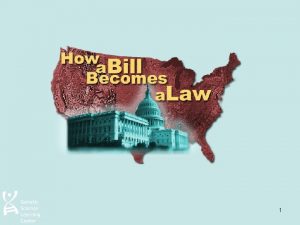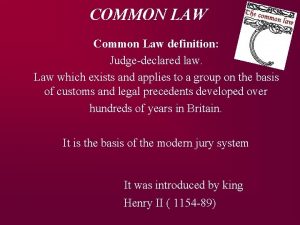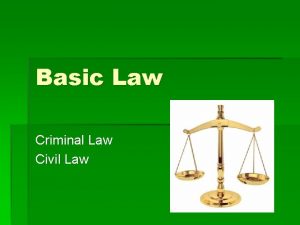1 Who can propose a law Anyone can
























- Slides: 24

1

Who can propose a law? • Anyone can suggest an idea for a law. • However, only a Member of Congress can take a proposed law to the House of Representatives or the Senate. 2

What happens first? • A member of the House or Senate drafts a bill. • They submit the bill to the House or Senate. • The bill is assigned a number that begins with: • H. R. for House of Representatives • S. for Senate • The bill is then sent to the appropriate 3

The Standing Committee • This is a permanent committee in the House or Senate that studies bills related to a general topic, such as education, agriculture or science. • The committee chair assigns the bill to the appropriate subcommittee. 4

The Subcommittee • The subcommittee studies bills related to a subset of the topics covered by the standing committee. • All of the members of the subcommittee are part of the standing committee. • Most of the discussion in Congress takes place here. • The chair of the subcommittee, in consultation with other committee members, decides whether to schedule a bill for discussion. • The subcommittee may also decide to stop action on a bill that they think is not necessary or 5

The Subcommittee - continued • The subcommittee first holds hearings on the bill, giving supporters, opponents and experts a chance to voice their views. • Amendments (changes) to the bill are then suggested and voted on. • The subcommittee may also decide to write an entirely new bill. • Finally, the subcommittee votes on whether to take the bill to the full committee for a vote. • If the bill does not pass, it dies. 6

The Standing Committee • The committee discusses the bill. • Committee members suggest and vote on amendments. • The committee votes on whether to send the bill to the full House or Senate. 7

The Standing Committee – cont. • If the bill passes, the committee writes a report explaining: • The key points of the bill • The changes they have made • How this bill compares to current laws • Why they recommend this bill for approval • The bill and the report are then sent to the full House or Senate. 8

The Floor (whole House or Senate) • The bill is placed on the calendar of the House or Senate until it is scheduled for discussion. • The House and Senate have different rules for debating the bill. 9

Debate on the House floor • The House is chaired by the Speaker of the House • Before debate begins, a time limit is set for how long any Member can speak (usually 1 – 5 minutes). • First a Member speaks who is for the bill and then one who is against the bill. Debate continues in this way. 10

Debate on the House floor – cont. • Debate on a bill can be ended by a simple majority vote. • Following this debate, amendments to the bill can then be suggested and debated. The same rules apply. • Finally, the bill is put to a vote. 11

Debate on the Senate floor • The Senate is chaired by the Vice President; the President Pro Tempore may chair in his place. • There are no time limits to debate in the Senate. Members may speak for as long as they choose. • Amendments may be offered at any time during debate. • At the end of debate, the bill is put to a 12 vote.

What happens next? • Both the House and the Senate must pass similar forms of a bill. • If a bill is passed in only the House or the Senate, it is sent to the other one for debate, amendment and a vote. • After both the House and the Senate have passed similar bills, the two bills are sent to a conference committee. 13

The Conference Committee • The conference committee includes members of both the House and the Senate. • The committee discusses the differences between the two bills. • They re-write the bill in a form that they think will pass in both the House and the Senate and vote on it. • After they pass the re-written bill, the committee writes a report that contains: • The re-written bill • An explanation of how they worked out the differences between the two bills 14

Back to the floor • The conference committee report with the re-written bill is sent to the House for a vote. • If the House passes the bill, it is sent to the Senate. • If the House or the Senate does not pass the bill, it dies. • If the bill passes in both the House and the Senate, it is sent to the President. 15

The President has 4 options: 1. Sign into law. He can sign the bill, which then becomes a law. 2. Law without signature. He can let the bill sit on his desk for 10 days without signing it while Congress is in session. The bill then becomes a law. 16

The President - continued 3. Veto. He can choose to not sign the bill, so it will not become a law. However, if the bill is then passed by 2/3 of both the House and the Senate, it still becomes a law. 4. Pocket veto. If, after 10 days, he has not signed it and Congress is no longer in session, the bill does not become a law. 17

• • I’m just a bill, Yes, I’m only a bill, And I’m sitting here on Capitol Hill. Well, it’s a long, long journey To the capital city, It’s a long, long wait While I’m sitting in committee But I know I’ll be a law someday. . . 18

• • At least I hope and pray that I will, But today I’m still just a bill. {Interlude} I’m just a bill, Yes I’m only a bill, And I got as far as Capitol Hill. Well, now I’m stuck in committee And I sit here and wait 19

• • While a few key Congressmen Discuss and debate Whether they should Let me be a law… Oh how I hope and pray that they will, But today I am still just a bill. {Interlude} 20

• • I’m just a bill, Yes I’m only a bill, And if they vote for me on Capitol Hill, Well then I’m off to the White House Where I’ll wait in a line With a lot of other bills For the President to sign. 21

• • And if he signs me then I’ll be a law. . . Oh, how I hope and pray that he will, But today I am still just a bill. {Interlude} No! But how I hope and I pray that I will, But today I am still just a bill! {Interlude} 22

Acknowledgement for Song • School House Rocks website. – http: //media. atlanticrecords. com/media/schoolhouse_ro ck_rocks/schoolhouse_rocks/ bill. wav 23

Work Cited • On Separate MS Word Document 24
 Where anyone can be anything
Where anyone can be anything How did harvey maxwell propose miss leslie
How did harvey maxwell propose miss leslie Bare infinitive
Bare infinitive What did democritus propose
What did democritus propose Man proposes god disposes meaning
Man proposes god disposes meaning Space bar
Space bar Newton's first law and second law and third law
Newton's first law and second law and third law Newton's first law
Newton's first law V=k/p
V=k/p Boyle's law charles law avogadro's law
Boyle's law charles law avogadro's law Elements of spoken word poetry
Elements of spoken word poetry Repetition sound device
Repetition sound device If anyone preaches another jesus
If anyone preaches another jesus Neighbor
Neighbor Don't let anyone take your crown
Don't let anyone take your crown You owe nothing to anyone
You owe nothing to anyone Mr brown receives a salary than anyone else in the company
Mr brown receives a salary than anyone else in the company Some something any anything
Some something any anything Why does jocasta's story upset oedipus?
Why does jocasta's story upset oedipus? A dependent adult is anyone over the age of 65.
A dependent adult is anyone over the age of 65. Who is they
Who is they Of course anyone who has ever perused
Of course anyone who has ever perused After me after me after me
After me after me after me Not just anyone
Not just anyone John 4:8
John 4:8















































